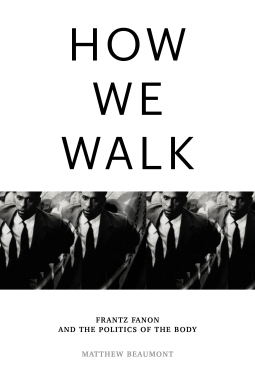
How We Walk
Frantz Fanon and the Politics of the Body
by Matthew Beaumont
This title was previously available on NetGalley and is now archived.
Buy on Amazon
Buy on BN.com
Buy on Bookshop.org
*This page contains affiliate links, so we may earn a small commission when you make a purchase through links on our site at no additional cost to you.
Send NetGalley books directly to your Kindle or Kindle app
1
To read on a Kindle or Kindle app, please add kindle@netgalley.com as an approved email address to receive files in your Amazon account. Click here for step-by-step instructions.
2
Also find your Kindle email address within your Amazon account, and enter it here.
Pub Date Mar 12 2024 | Archive Date Jul 08 2024
Verso Books (US) | Verso
Talking about this book? Use #HowWeWalk #NetGalley. More hashtag tips!
Description
"In this fascinating and wide-ranging book, Beaumont reminds us that walking is far from a neutral activity. With the help of Frantz Fanon, Beaumont locates freedom at the level of the body; free from the systems of oppression, exploitation, and harassment."
–Lauren Elkin, author of Flâneuse
How race, class, and politics influence the way we move
You can tell a lot about people by how they walk. Matthew Beaumont argues that our standing, walking body holds the social traumas of history and its racialized inequalities. Our posture and gait reflect our social and political experiences as we navigate the city under capitalism. Through a series of dialogues with thinkers and walkers, his book explores the relationship between freedom and the human body
How We Walk foregrounds the work of Frantz Fanon, psychiatrist and leading thinker of liberation, who was one of the first people to think about the politics of ‘walking while black’. It also introduces us to the renegade psychoanalyst Wilhelm Reich, who wrote that one could discern the truth about a person through their posture and gait. For Marxist philosopher Ernst Bloch, the ability to walk upright and with ease is a sign of personal and social freedom.
Through these excursions, Beaumont reimagines the canonical literature on walking and presents a new interpretation of the impact of class and race on our physical and political mobility, raising important questions about the politics of the body.
–Lauren Elkin, author of Flâneuse
How race, class, and politics influence the way we move
You can tell a lot about people by how they walk. Matthew Beaumont argues that our standing, walking body holds the social traumas of history and its racialized inequalities. Our posture and gait reflect our social and political experiences as we navigate the city under capitalism. Through a series of dialogues with thinkers and walkers, his book explores the relationship between freedom and the human body
How We Walk foregrounds the work of Frantz Fanon, psychiatrist and leading thinker of liberation, who was one of the first people to think about the politics of ‘walking while black’. It also introduces us to the renegade psychoanalyst Wilhelm Reich, who wrote that one could discern the truth about a person through their posture and gait. For Marxist philosopher Ernst Bloch, the ability to walk upright and with ease is a sign of personal and social freedom.
Through these excursions, Beaumont reimagines the canonical literature on walking and presents a new interpretation of the impact of class and race on our physical and political mobility, raising important questions about the politics of the body.
Available Editions
| EDITION | Other Format |
| ISBN | 9781804290071 |
| PRICE | $24.95 (USD) |
| PAGES | 224 |
Available on NetGalley
NetGalley Shelf App (PDF)
Send to Kindle (PDF)
Download (PDF)



